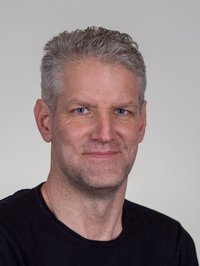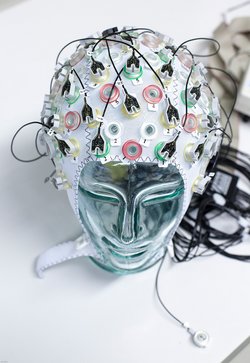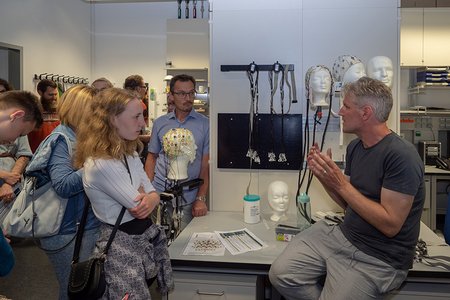Translational Behavioral Physiology
The mission of our group is to translate basic neuroscientific learning research into applied clinical and engineering research, and back. This affords to build integrative bridges across levels of brain organization, species, scientific disciplines, individual and population levels of analysis, and from open- to closed-loop conditions. Functionally, we employ a dynamic, enactive embodied cognition approach. In particular, our research focuses on the question, how layer-specific cortical, and thalamocortical interactions, and their plastic changes, contribute to normal cognitive functioning and to pathological dysfunctions. As part of the core facility of the LIN, we provide a wide range of electrophysiological and behavioral methods. With respect to data analysis we have expertise in the fields of time-series analysis, and multivariate statistical pattern analysis.
- Head
Head

Matthias Deliano studied biology at the Ludwig-Maximilians-University in Munich. He was sponsored by the Studienstiftung des deutschen Volkes. He wrote his diploma thesis on time-frequency analysis of the human electroencephalogram (EEG) in time perception at the Laboratoire de Neurosience Cognitives et Imagerie Cérébral of the Centre National de la Recherche Scientifique (CNRS) in Paris in Francisco Varela's research group. He then earned his doctorate at the LIN on cortical sensory neuroprostheses in the Department of Acoustics, Learning, Language of Henning Scheich (summa cum laude).
Today Deliano is a learning researcher and neurophysiologist in the field of translational behavioral physiology.
- Members
Members
Head Dr. Matthias Deliano +49-391-6263-94451 matthias.deliano@lin-magdeburg.de PhD student Jing Ma +49-391-6263-92201 jing.ma@lin-magdeburg.de Student Marie Fiedler - Projects
Projects
- Central mechanisms of therapeutic, neuromodulatory electric stimulation via neural implants
- Transsynaptic mechanisms of adaptation and its functional role in the central nervous system
- Changes in brain dynamics by antidepressant, sub-anaesthetic doses of Ketamine
- The dynamics of closed-loop man-machine interactions during neurofeedback learning
- Active transfer of learning
- Cortical phase transitions and criticality during learning
- Methods
Methods

EEG cap (Picture: CBBS/Dirk Mahler) In the human we combine electroencephalography (EEG) with various psychophysiological measures like electrocardiographic signals (ECG), electrodermal responses (GSR), and eye tracking data. We apply various forms of sensory stimulation, transcranial electric stimulation, as well as stimulation via neural implants in neurpsychiatric patients.
In freely behaving, learning rodents we record electrocorticograms (ECoGs), as well as layer-specific local fieldpotentials (LFPs) and action potentials (APs) from chronically implanted multielectrode arrays. To reconstruct synaptic mass currents we employ current-source-density analysis. Besides auditory stimulation, we apply intracortical microstimulation (ICMS) and optogenetic stimulation. As a learning paradigm we employ two-way active avoidance training in a shuttle-box.
- Cooperations
Cooperations
Local:
- Lars Büntjen, University Department of Stereotactic Neurosurgery, Otto-von-Guericke University, Magdeburg
- Georg Krempl, Department of Technical and Business Information Systems (ITI), Otto-von-Guericke University, Magdeburg
Worldwide:
- Rosemarie Grantyn, Cluster of Excellence NeuroCure, Berlin, Germany; Department of Experimental Neurology, University Medicine Charité, Berlin
- Karsten Tabelow and Jörg Polzehl, Research Group Stochastic Algorithms and Nonparametric Statistics, Weierstrass Institute for Applied Analysis and Stochastics, Berlin, Germany.
- Andrew Latham and David Balleine, Department of Philosophy, University of Sydney, Australia
- Martin Walter and Zumrut duygu Sen , Translational Psychiatry Group, Department of Psychiatry, University of Tübingen
- Teaching
Teaching
We are involved in the education of students of the Master's program "Integrative Neuroscience", the Bachelor's program "Philosophy, Neurosciences, Cognition" and the focus "Learning Systems" in the Computer Science program.
We teach and offer internships in macroimaging, experimental approaches in neurobiological learning research and multivariate statistics at the OVGU.
- Open Positions
Open Positions
We encourage young scientist to join our running projects or develop their own research ideas in our lab with respect to Bachelor- or Master-theses or HiWi-positions.
Topics we offer for instance on a regular basis are:
- Assistance in EEG-measurements
- Programming for experiments and data analysis (Matlab, Python, R) of behavioral and physiological signals.
If you are interested to get in touch with us, do not hesitate to come around or contact us at: deliano(at)lin-magdeburg.de - Media coverage
- Other activities
Other activities

Matthias Deliano explains how an EEG works during the Long Night of Science - Long Night of Science (Lange Nacht der Wissenschaft)
- Summerschool "Learning Systems / Biocomputing", Otto-von-Guericke University
- Further training for teachers and pupils together with the State Institute for School Quality and Teacher Training of the State of Saxony-Anhalt
- Long Night of Science (Lange Nacht der Wissenschaft)

![[Translate to English:] [Translate to English:]](/fileadmin/_processed_/e/5/csm_Kofbild_Forschung_Mobile3_0c8efb57c5.jpg)
